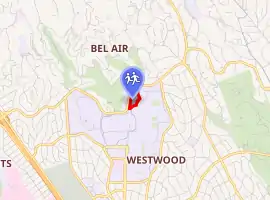UCLA Lab School
UCLA Lab School is the laboratory school of the UCLA School of Education & Information Studies (Ed&IS) [https://gseis.ucla.edu/]. Located on UCLA's main Westwood campus since 1947, it currently serves 450 students ranging in ages from 4 through 12.[1][2] Originally known as University Elementary School, and from 1982 as Corinne A. Seeds University Elementary School,[3] the name was changed in 2009 to better convey the school's purpose as a laboratory for research and innovation in education.[2] CONNECT, an onsite research center, helps link educators and researchers to explore ideas about teaching, learning, and child development.[4]
| UCLA Lab School | |
|---|---|
| Address | |

| |
330 Charles E. Young Drive North , 90095 | |
| Coordinates | 34.0754°N 118.4441°W |
| Information | |
| Type | Laboratory school |
| Established | 1882 |
| Oversight | University of California, Los Angeles |
| Principal | Georgia Ann Lazo |
| Grades | Pre-K–6 |
| Gender | Coeducational |
| Website | www |
History
UCLA Lab School was founded in 1882, as the demonstration school of the California State Normal School at Los Angeles. Located on the site of today’s Central Library in downtown Los Angeles, the normal school prepared teachers for educating the growing city.
By 1914, enrollment at the normal school had far exceeded capacity, and the institution, along with the children's school, moved to a Hollywood ranch off a dirt road that later became Vermont Avenue. In 1919, the regents approved the establishment of the “Southern Branch of the University of California,” a two-year college located at the normal school. The two-year college expanded and officially became UCLA in 1927. Two years later UCLA moved to Westwood[5] and the children's school began leasing property owned by Los Angeles City Schools, on Warner Avenue.
In 1929, the children’s school was called University Elementary School (UES) and the principal was Corinne A. Seeds. A visionary educator who was influenced by the teachings of John Dewey, Seeds became a key figure in developing and promoting progressive education during the 1930s, '40s and '50s.[6] She believed that "to keep education dynamic, children must have experiences that they care about."
In 1945, the university lost its lease on the Warner Avenue location and was told to vacate the site by the following year. From September 1946 to June 1947, UES was without a schoolhouse, but some classes continued in private homes.[7]
Supporters of Seeds and progressive education successfully lobbied the state legislature to provide funds to relocate the school to the UCLA campus. Wartime restrictions prevented new building, but supporters found unused army barracks and transferred them to the Westwood campus to be used as a temporary school facility.[8]
The first permanent school buildings for the elementary school were completed in 1950. They were designed by architects Robert Alexander and Richard Neutra, who became prominent in the mid-century modern design movement.[9][10][11] The architects worked closely with Seeds and other members of the school community to create a campus that takes advantage of the natural landscape and promotes children’s movement and exploration through the integration of indoor and outdoor space and flexible configurations of the learning environment.
Notable alumni
- Leonardo DiCaprio – actor
- Derek Bok – lawyer, educator, and former president of Harvard University
- Andrea Fay Friedman – Actress
- Eric Garcetti – politician, Mayor of Los Angeles
- Kim Gordon – musician, Sonic Youth
- Jane Gottlieb – artist[12]
- Alex Greenwald – lead singer of Phantom Planet
- Emma Walton Hamilton – actress and author of children's books
- Henry McHenry – biological anthropologist
- Jason Schwartzman – actor and musician
- Earl Sweatshirt – rapper, record producer, skateboarder, musician, and former member of Los Angeles-based hip hop collective Odd Future
References
- "GSE&IS Facts".
- "About". UCLA Lab School. December 9, 2015.
- "Famed UCLA elementary school gets new name". Los Angeles Times. March 10, 2009.
- "Research". UCLA Lab School. December 9, 2015.
- Weiler, Kathleen (1998), Country Schoolwomen: Teaching in Rural California,1850-1950, Stanford: Stanford University Press, ISBN 978-0804730044
- Seeds, Corinne Aldine (Speaker) (1963). ‘‘UES: A History of a Creative Elementary School’’. Los Angeles: Oral History collection, Dept. of Special Collections, University Library, University of California, Los Angeles.
- Richard Neutra
- "Society Of Architectural Historians/Southern California Chapter". www.sahscc.org.
- Kapitanoff, Nancy (1991-05-19). "Lifelong Love of Cars Develops Into Photography Career: Jane Gottlieb takes pictures of both classics and wrecks that have personality, and then adds her own vibrant colors". Los Angeles Times.
Bibliography
- Weiler, Kathleen (1998). Country Schoolwomen: Teaching in Rural California,1850-1950. Stanford: Stanford University Press. ISBN 978-0804730044.
- Weiler, Kathleen (2011). Democracy and Schooling in California: The Legacy of Helen Heffernan and Corrine Seeds. New York: Palgrave Macmillan. ISBN 978-0-230-33824-1.
